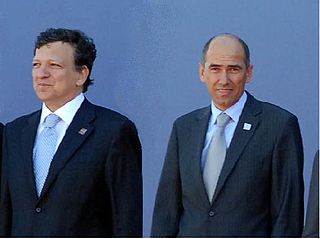Related Research Articles

Milan Horáček is a Czech-born German politician, a founding member of the German Green Party, a former member of the Bundestag (1983–1985) and a former Member of the European Parliament (2004–2009).

Gisela Kallenbach is a German politician. She was a Member of the European Parliament for Alliance '90/The Greens, part of the European Greens, from 2004 to 2009. Since 2009, she has been a member of the Parliament of Saxony. From 2000 to 2003, she was International Mayor of the United Nations Interim Administration Mission in Kosovo. She was awarded the Order of Merit of the Federal Republic of Germany in 2001.

Zuzana Roithová is a Czech politician and former Member of the European Parliament. She was vice-chair of the European Parliament's Committee on the Internal Market and Consumer Protection, a substitute on the Committee on Women's Rights and Gender Equality and a member of the Delegation for relations with the countries of Central America.
In the resolution 1481/2006 of the Council of Europe Parliamentary Assembly (PACE) issued on 25 January 2006 during its winter session, the Council of Europe "strongly condemns crimes of totalitarian communist regimes".

Lars Göran Axel Lindblad is a Swedish politician and member of the Moderate Party. He served as a member of the Swedish parliament 1997–2010, representing the constituency of Gothenburg. He served as a replacement member of parliament 1993–1997, and again since 2010. Lindblad has chaired the Swedish delegation to the Parliamentary Assembly of the Council of Europe (PACE) and served as Vice President of PACE as well as chair of the Political Affairs Committee. He was a member of the Parliamentary Assembly 2004–2010. In October 2011, he was elected President of the Platform of European Memory and Conscience.

Emanuelis Zingeris is a Lithuanian philologist, museum director, politician, signatory of the 1990 Act of the Re-Establishment of the State of Lithuania, currently serving as a Member of the Seimas, chairman of its foreign affairs committee, Vice President of the Parliamentary Assembly of the Council of Europe and President of the Parliamentary Forum of the Community of Democracies. A Lithuanian Jew, he has been director of the Vilna Gaon Jewish State Museum, honorary chairman of Lithuania's Jewish community, and is Chairman of the International Commission for the Evaluation of the Crimes of the Nazi and Soviet Occupation Regimes in Lithuania. He is a founding signatory of the Prague Declaration on European Conscience and Communism, that proposed the establishment of the European Day of Remembrance for Victims of Stalinism and Nazism.
The Institute for Information on the Crimes of Communism (IICC) is a Sweden-based non-profit and non-governmental human rights organization, founded in 2008, with the stated purpose of "spreading essential information on the crimes of communism and to promote vigilance against all totalitarian ideologies and antidemocratic movements". The institute is a member organization of the Platform of European Memory and Conscience, an educational project of the European Union bringing together government institutions and NGOs active in research, documentation, awareness raising and education about the crimes of totalitarian regimes.

The Black Ribbon Day, officially known in the European Union as the European Day of Remembrance for Victims of Stalinism and Nazism and also referred to as the Europe-wide Day of Remembrance for the victims of all totalitarian and authoritarian regimes, is an international day of remembrance for victims of totalitarianism regimes, specifically Stalinist, communist, Nazi and fascist regimes. Formally recognised by the European Union, the Organization for Security and Co-operation in Europe and some other countries, it is observed on 23 August. It symbolises the rejection of "extremism, intolerance and oppression" according to the European Union. The purpose of the Day of Remembrance is to preserve the memory of the victims of mass deportations and exterminations, while promoting democratic values to reinforce peace and stability in Europe. It is one of the two official remembrance days or observances of the European Union, alongside Europe Day. Under the name Black Ribbon Day it is an official remembrance day of Canada. The European Union has used both names alongside each other.

The Prague Declaration on European Conscience and Communism was a declaration which was initiated by the Czech government and signed on 3 June 2008 by prominent European politicians, former political prisoners and historians, among them former Czech President Václav Havel and future German President Joachim Gauck, calling for "Europe-wide condemnation of, and education about, the crimes of communism." Much of the content of the declaration reproduced demands formulated by the European People's Party in 2004, and draws heavily on the theory or conception of totalitarianism.

Crimes Committed by Totalitarian Regimes are reports and proceedings of the European public hearing organised by the Slovenian Presidency of the Council of the European Union and the European Commission. The Hearing was organised in response to the request made by the Justice and Home Affairs Council of the European Union on 19 April 2007.
Martin Mejstřík is a Czech politician and human rights activist. He is notable for his role as a student leader during the Velvet Revolution that led to the ousting of the Communist regime in Czechoslovakia in November 1989. He served as a Senator in the Senate of the Parliament of the Czech Republic from 2002 to 2008, representing Prague 1 as an independent, and was a member of the Senate Committee on Education, Science, Culture, Human Rights and Petitions. Mejstřík is a founding signatory of the Prague Declaration on European Conscience and Communism and the Declaration on Crimes of Communism. He was also one of the politicians proposing the creation of the Institute for the Study of Totalitarian Regimes. In 2007, he proposed a ban on "communist and all totalitarian propaganda and symbols".

Pavel Žáček is a Czech academic and politician who served as the first Director of the Institute for the Study of Totalitarian Regimes, the Czech government agency and research institute tasked with investigation of the crimes of the Communist regime of Czechoslovakia that was declared to be criminal in 1993. In 2017, he was elected to the Chamber of Deputies and serves as a Civic Democratic MP.

Crimes against humanity under communist regimes occurred throughout the 20th century, including forced deportations, massacres, torture, forced disappearances, extrajudicial killings, terror, ethnic cleansing, enslavement and the deliberate starvation of people i.e. during the Holodomor and the Great Leap Forward. Additional events included the use of genocide, conspiracy to commit genocide, and complicity in genocide. Such events have been described as crimes against humanity.
The Platform of European Memory and Conscience is an educational project of the European Union bringing together government institutions and NGOs from EU countries active in research, documentation, awareness raising and education about the crimes of totalitarian regimes. Its membership includes 68 government agencies and NGOs from 15 EU member states and 8 non-EU countries including Ukraine, Albania, Georgia, Iceland, Moldova, the United Kingdom, the United States and Canada. Its members include the Institute of National Remembrance, the Berlin-Hohenschönhausen Memorial, the Stasi Records Agency and the Victims of Communism Memorial Foundation. The platform has offices in Prague and Brussels (formerly). The President of the platform is Łukasz Kamiński, former President of the Polish Institute of National Remembrance.
The European Public Hearing on European Conscience and Crimes of Totalitarian Communism: 20 Years After was a European public hearing organised by the Czech Presidency of the European Union in the European Parliament on 18 March 2009. The hearing was described by the Presidency as "the third step towards the establishment of a European Platform of Memory and Conscience to support the activities of institutions engaged in reconciling with totalitarian regimes in Europe."
The European Parliament resolution of 2 April 2009 on European conscience and totalitarianism was a resolution of the European Parliament adopted on 2 April 2009 by a vote of 533–44 with 33 abstentions, in which the European Parliament condemned totalitarian crimes and called for the recognition of "Nazism, Stalinism and fascist and Communist regimes as a common legacy" and for "an honest and thorough debate on their crimes in the past century." The resolution also called for several measures to strengthen public awareness of totalitarian crimes.
Miroslav Lehký is a Czech/Slovak human rights activist and civil servant, and the current Deputy Director and Chairman of the Advisory Board of the Institute for the Study of Totalitarian Regimes. He was involved in founding the institute. He is signatory of the Charter 77 manifesto and a founding signatory of the Prague Declaration on European Conscience and Communism. During communist rule in 1980s, he was a co-organizer of the underground university in Bratislava. From 1990 to 1994, he was secretary to the Czechoslovak/Czech Helsinki Committee. He was employed by the Office for the Documentation and the Investigation of the Crimes of Communism from 1995 to 2003, and was involved in founding the Nation’s Memory Institute in Slovakia in 2003. He studied theology from 1968 to 1970, but was not able to finish his studies due to political persecution by the communists.
The Seventy Years Declaration was a declaration initiated by academics Dovid Katz and Danny Ben-Moshe and released on 20 January 2012 to protest against the policies of several European states and European Union bodies on the evaluation, remembrance and prosecution of crimes committed under communist dictatorships in Europe, specifically policies of many European countries and the EU treating the Nazi and Stalinist regimes in Eastern and Central Europe as equally criminal. Presented as a response to the Prague Declaration on European Conscience and Communism initiated by the Czech government in 2008 to condemn communism as totalitarian and criminal, it explicitly rejects the idea that the regimes of Joseph Stalin and Adolf Hitler are morally equivalent, i.e. the totalitarianism theory that was popularized by academics such as Hannah Arendt, Carl Friedrich and Zbigniew Brzezinski and became dominant in Western political discourse during the Cold War, and that has gained new momentum in many new EU member states following the fall of communism, resulting in international resolutions, establishment of research institutes and museums, and a day of remembrance. The declaration also states that communist regimes did not commit genocides, citing the 1948 Genocide Convention which restricts genocide to mass killings related to ethnicity, race, nationality, or religion. The declaration advances the position that the Holocaust was unique, a subject of some debate. The declaration was signed by 70, mostly left-wing, parliamentarians from Europe. It was released on the 70th anniversary of the Wannsee Conference in Berlin.
The Estonian Institute of Historical Memory is a non-governmental foundation that focuses on the investigation of war crimes and human rights violations committed by totalitarian regimes and research of totalitarian ideologies that created such regimes. The Institute aims to give the general public a comprehensive, objective and international overview of human rights violations and crimes committed by totalitarian regimes both in Estonia and abroad.
The European Parliament resolution of 19 September 2019 on the importance of European remembrance for the future of Europe was a resolution of the European Parliament adopted on 19 September 2019 with 535 votes in favor, 66 against, and 52 abstentions, which called for remembrance of totalitarian crimes and condemned propaganda that denies or glorifies totalitarian crimes, and linked such propaganda to Russian information warfare against "democratic Europe."
References
- ↑ "International conference: Crimes of the Communist Regimes". Institute for the Study of Totalitarian Regimes. Archived from the original on 2011-03-17. Retrieved 2011-05-14.
- ↑ "International Conference: Crimes of the Communist Regimes: About the conference". Institute for the Study of Totalitarian Regimes. Archived from the original on 2011-01-29. Retrieved 2011-05-14.
- ↑ "Declaration on Crimes of Communism". Institute for the Study of Totalitarian Regimes. Archived from the original on 2011-07-20. Retrieved 2011-05-14.
